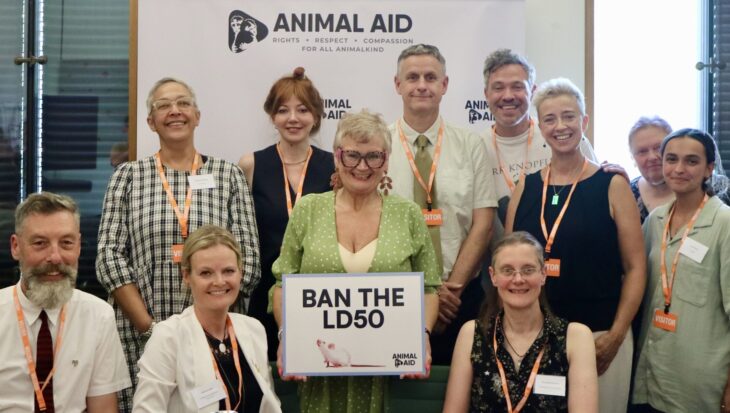Medical research charities that fund animal experiments are keen for the public not to discover their true objectives with regard to the protection of animals in laboratories. Whilst stating publicly that welfare standards should be preserved in new UK legislation, their joint submission to a government consultation contained demands to water down key aspects of animal protection. Given that these charities fund a large proportion of animal experiments (such as the distressing examples highlighted in Animal Aid’s Victims of Charity report), such demands are perhaps not unsurprising, but are sure to trouble an increasingly sceptical public.
The UK government is now working on the latter stages of transposing an EU Directive, which will establish the legislatory framework for years to come. An article in last week’s British Medical Journal quotes the chief executive of the Association of Medical Research Charities (AMRC) as saying ‘Medical research is the most popular recipient of charitable giving in the UK, funding £1bn of research a year – about a third of the total. It is really important that we don’t lose this public confidence, and charities are very clear that standards will be maintained’.
The article then goes on to highlight how the self-styled UK Bioscience Coalition – which includes, via AMRC, charities like Cancer Research UK and the British Heart Foundation – is opposed to simply maintaining higher UK welfare standards where they exist. Instead, the Bioscience Coalition’s default option – as set out in its submission to the Home Office – is to ‘harmonise’ requirements unless there is ‘credible evidence that existing UK specifications would enhance welfare standards’. The Bioscience Coalition rejects what it says is the ‘automatic assumption that stricter specifications equate to improved welfare standards’.
The Animal Procedures Committee (APC), an independent body tasked with offering the Home Secretary ‘independent, expert and balanced advice in relation to the use of animals for experimental purposes’, also submitted a response to last year’s consultation. Its advice in many instances is contradictory to the desires of the Bioscience Coalition. The following analysis contrasts the strident demands of vested interests, determined to weaken the already meagre protection offered to the subjects of animal experiments, with the recommendations of the APC.
- Overall, the Bioscience Coalition’s favoured option is to ‘transpose the minimum requirements of the Directive’.
It claims ‘the UK should not be put in a position of being under different rules than those operating in the rest of Europe other than where there is sound evidence that there would be benefits to animal welfare’.
The APC, by contrast, favours implementing the requirements of the Directive where these are more stringent, and retaining some of the higher UK standards and requirements already in force.
- The Bioscience Coalition wants dispensation to omit full details of its experiments.
Under current legislation, Home Office Inspectors conduct an analysis of harms to animals against any putative benefits of the experiments before allowing them to proceed – this clearly depends on inspectors being given precise experimental protocols. This vetting system, whilst far from perfect in protecting animals (the number of animal experiments has risen inexorably since 2000), nevertheless provides a measure of independent scrutiny.
The Bioscience Coalition essentially wants to conduct this balancing itself – it proposes a ‘more flexible and risk-based licensing system in which the expected benefits and welfare impact of a procedure is the basis for the authorisation, rather than the details of procedures to be undertaken’. This is a far more permissive proposal than what currently exists, and would benefit animal experimenters in many ways. Perversely, the Bioscience Coalition advances this proposal as one that would ‘permit much more openness over licence details’.
The APC does not address this issue directly, but its comments on this section are not consistent with any desire for secrecy: a ‘more comprehensive approach [to licence applications] would be in line with recitals 12 and 41, which recognise the ethical concerns of the public, and the need to inform the public about animal use’.
- The Bioscience Coalition is adopting a deliberately complex and obstructive attitude to maintaining higher UK standards of care and accommodation.
The Bioscience Coalition’s position is that any lower EU ‘Annex III’ requirement should be adopted, unless ‘there is specific evidence that it would have a demonstrably negative impact on animal welfare’. The Bioscience Coalition is of course well aware of the difficulty in demonstrating that, for example, rodents, dogs and farm animals would suffer from being in smaller cages than their already meagre allowances.
The APC is clear on this point, and takes the ‘common sense’ as well as the scientific approach – ‘Annex III was finalised several years ago and represents the minimum acceptable standards for accommodation and care, which are not intended to be ‘best practice’…the majority of animal behaviour studies show that animals benefit from having sufficient space to perform a range of species-specific behaviours, including social behaviour and exercise, and that they benefit from environmental enrichment – which also requires adequate space. It can thus be argued from a ‘benefit of the doubt’ aspect that higher standards should be retained. This might also reassure the public that the UK is committed to good laboratory animal welfare’.
- The Bioscience Coalition wants to evaluate its experiments itself, and have no evaluation of many experiments, including those that caused significant animal suffering.
Retrospective assessment of animal experiments is currently undertaken by the Home Office in about 75 per cent of cases, when projects are renewed. The Inspectorate is currently the ‘competent body’ to conduct these reviews. It is clear that the Bioscience Coalition views any government involvement in this process as undesirable meddling. It wishes to designate local Animal Welfare Bodies as the competent authority to undertake retrospective assessments. These may legally comprise only two members of the research team (the Bioscience Coalition, although ‘considering it appropriate to encourage’ wider membership, still wants ‘flexibility’ for smaller establishments and those carrying out a narrow range of procedures).
About 20 per cent fewer projects under the EU Directive would require retrospective assessment. In addition, Member States may exempt projects involving procedures classified as ‘mild’ or ‘non-recovery’ from the requirement for a retrospective assessment, except where these projects use non-human primates.
The Bioscience Coalition supports the use of these exemptions. It also suggests that only those ‘moderate’ projects involving procedures new to the UK be subject to a retrospective review. The decision as to whether a whole tranche of experiments involving very significant animal suffering, and experiments carried out under terminal anaesthesia, would be analysed would then depend on the whims of the researchers.
The APC, by contrast, believes that all projects should undergo retrospective assessment. It points out that ‘exempting some procedures on the basis of their predicted severity is not a logical approach, because (i) severity may not always be accurately predicted and (ii) there is no logical basis for assuming that new insights about the application of the Three Rs will only be applicable to procedures within the same severity category. For example, lessons from a mild procedure could also be applied to moderate and severe procedures’. It proposes a strict and comprehensive approach to the process, and assumes that the Home Office would remain the overseeing competent authority.
- The Bioscience Coalition wants less scrutiny of animal experiments, less emphasis on regulation, and fewer visits by inspectors
There are currently 188 designated animal establishments in England, Scotland and Wales, to which just under 2000 visits were carried out by Home Office inspectors in 2010. About half of these visits were unannounced. The consultation estimated that implementing the minimum requirements of the Directive would require a paltry 80 inspections per year in the UK, with between 3 and 5 years between inspections for some establishments.
Whilst the Bioscience Coalition accepts that there would need to be ‘more inspector visits than the Directive minimum’, it clearly foresees a chance to cut costs to experimenters via fewer visits. It wants a ‘cost-benefit review’ of Inspectorate time input before final decisions on inspections are formulated, and for inspectors to move away from an ‘unnecessarily complex regulatory system’ in favour of advice. The proposal above for a laxer licensing regime would mean inspectors would have less scope for checking experiments, and uncovering violations of protocols. This would mean ‘the audit and advisory functions of the Inspectorate can be achieved with fewer visits’. These kinds of visits, of course, would probably be announced in advance.
The APC, however, strongly believes that the current system of inspection in the UK should be retained, with regular announced and unannounced visits. Its view is that the ‘UK Inspectorate is a valuable asset to the scientific community and should not be compromised in any way’. A ‘drastically reduced inspection rate would also be very deeply damaging indeed to public confidence in the legislation, particularly as the Home Office envisages that many visits would have to be by appointment’. The APC suggests that sufficient resources are made available to employ more inspectors, rather than trying to cut costs.

